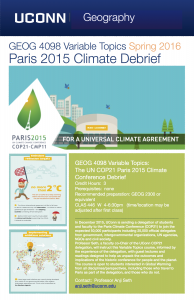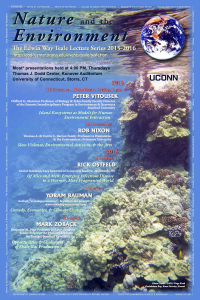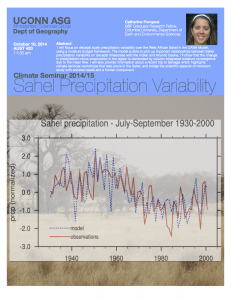Anji Seth
“Welcome to those who are working to save our planet”
“Later will be too late”
“We can’t tell our children we didn’t know”
“The world is in our hands”
“7 Billion people, one planet”
 Billboards across Paris, in Charles DeGalle airport, in metro stations, and on historic buildings, reminded us constantly why we were there. Our group of 12 students and 6 faculty/staff from UConn were on a mission to learn about and participate in the historic events taking place, as UN Envoys and negotiators work on an international agreement that would limit global warming to [2C][1.5C]*. This is the 21st UN Conference of the Parties, or COP21.
Billboards across Paris, in Charles DeGalle airport, in metro stations, and on historic buildings, reminded us constantly why we were there. Our group of 12 students and 6 faculty/staff from UConn were on a mission to learn about and participate in the historic events taking place, as UN Envoys and negotiators work on an international agreement that would limit global warming to [2C][1.5C]*. This is the 21st UN Conference of the Parties, or COP21.
 More than 20 years ago the United Nations agreed to “talk” about Global Warming. The road to Paris has been long and the stars are now aligning for an international agreement to “act”. The scientific evidence is overwhelming and indisputable, global leaders have been educated and show some understanding of the threats to nations, people and ecosystems, and people across the planet are calling for action. Clearly those who deny the science are on the wrong side of history. The final agreement to act from the Paris 2015 COP21 will not be perfect, there should be a review process in place to further reduce emissions over time, but the agreement will be a starting point for action over the next 20 years.
More than 20 years ago the United Nations agreed to “talk” about Global Warming. The road to Paris has been long and the stars are now aligning for an international agreement to “act”. The scientific evidence is overwhelming and indisputable, global leaders have been educated and show some understanding of the threats to nations, people and ecosystems, and people across the planet are calling for action. Clearly those who deny the science are on the wrong side of history. The final agreement to act from the Paris 2015 COP21 will not be perfect, there should be a review process in place to further reduce emissions over time, but the agreement will be a starting point for action over the next 20 years.
 We travelled to Paris with a 12 students from across the UConn colleges, each passionate about their discipline and the global context in which they will make their marks. During the last 20 years global warming has been in the realms of climate-related sciences, economics and policy, the next 20 years there will be a role for everyone.
We travelled to Paris with a 12 students from across the UConn colleges, each passionate about their discipline and the global context in which they will make their marks. During the last 20 years global warming has been in the realms of climate-related sciences, economics and policy, the next 20 years there will be a role for everyone.
Implementation of the Paris agreement will require artists and engineers, teachers and health professionals, ecologists, attorneys and business leaders. The careers of UConn students will follow the implementation of the Paris agreement over the next 20+ years. Today’s students will be in the driver’s seat for reducing greenhouse gas emissions, implementing carbon pricing, adapting local infrastructure, and assisting ecosystems in need.
These are exciting times. Let’s get to work.
*[brackets] indicate items under negotiation.
Anji Seth is an Associate Professor in the Department of Geography with expertise in climate science. See http://climate.lab.uconn.edu


